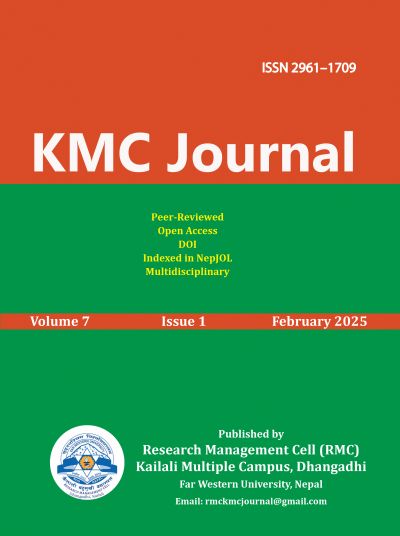Political Governance and Stock Market Performance: An Autoregressive Distributed Lag Analysis of the Nepalese Market
DOI:
https://doi.org/10.3126/kmcj.v7i1.75136Keywords:
Political instability, stock market, governance, NEPSEAbstract
This study examined the relationship between political governance and stock market performance in Nepal from 2002 to 2022, using the Autoregressive Distributed Lag (ARDL) model. Political governance indicators—Voice and Accountability (VA), Political Stability (PS), Government Effectiveness (GE), Regulatory Quality (RQ), Rule of Law (RL), and Control of Corruption (CC)—are analyzed for their short-and long-term impacts on the Nepal Stock Exchange (NEPSE) index. The results revealed significant long-run relationships with PS and GE positively influencing market performance, while CC and RQ show negative effects. RL and VA, however, do not exhibit statistically significant impacts. The short-term dynamics, assessed through an Error Correction Model (ECM), indicated a strong adjustment mechanism, with stock markets quickly reverting to equilibrium after short-term disturbances. Diagnostic tests confirmed the model’s reliability, and CUSUM and CUSUMSQ tests verify its stability over time. The study underscored the importance of PS in promoting investor confidence and market growth. Policymakers should carefully balance anti-corruption measures and regulatory improvements to avoid destabilizing the economy. These findings offered valuable insights for investors, policymakers and stakeholders on the role of political factors in shaping stock market performance in developing economies like Nepal.
Downloads
Downloads
Published
How to Cite
Issue
Section
License

This work is licensed under a Creative Commons Attribution-NonCommercial 4.0 International License.
This license allows reusers to distribute, remix, adapt, and build upon the material in any medium or format for noncommercial purposes only, and only so long as attribution is given to the creator.




